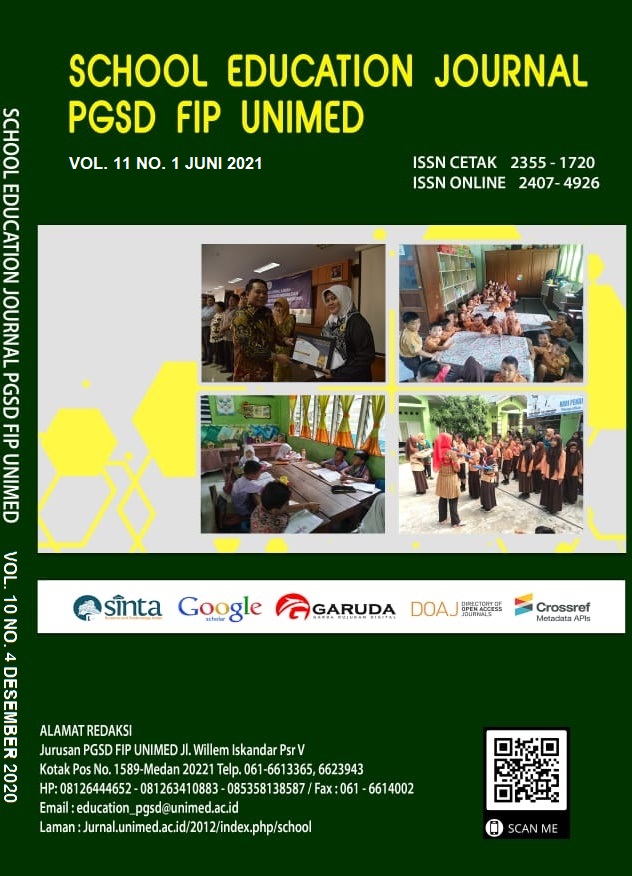ANALISIS KEMAMPUAN KOGNITIF MATEMATIKA MATERI OPERASI HITUNG PECAHAN MENGGUNAKAN VIDEO PEMBELAJARAN MATEMATIKA SISTEM DARING DI KELAS V SEKOLAH DASAR
DOI:
https://doi.org/10.24114/sejpgsd.v11i1.23391Abstract
This study aims to determine the cognitive ability of mathematics in the fraction count operation material using the online mathematics learning video system in class V of Elementary School No. 34 / I Lotus. The test was conducted to determine the students' cognitive abilities. There were 14 students out of 28 students who collected the test results. Based on the data analysis, it was found that the cognitive abilities of students in the high category were 6 students, while in the low category were 8 students. The results of the students 'high cognitive mathematics abilities were 50% and the students' low cognitive abilities were 50%. The results of observations from this study concluded that the students' lack of activeness during online learning using video lessons. This can be seen from the number of students who collected test results as many as 14 students out of 28 students. It can be concluded that students' cognitive mathematical abilities during online learning have different abilities. This can be seen from the level of student ability from the results of the tests carried out.Keyword: Cognitive Ability, Mathematics, Count Fraction OperationsReferences
Althabany, T.I.B 2014. Mendesain Model Pembelajaran Inovatif, Progresif, dan Kontekstual. Jakarta:Kencana.
Amiruddin. 2016. Perencanaan Pembelajaran. Yogyakarta: Parana Ilmu.
Ariyana, I K. S. 2020. Perumusan tujuan pembelajaran dan soal materi pecahan berbasis pada tingkat dimensi pengetahuan dan dimensi proses kognitif. In Prosiding Mahasaraswati Seminar Nasional Pendidikan Matematika 2020 (pp. 22-36).
Bloom, B.S., Engelhart, M.D., Furst, E.J., Hill, W.H., dan Krathwohl, D.R. 1956.
The Taxonomy of Educational Objectives The Classification of Educational Educational Goals, Handbook 1: Cognitive Domain. New York: David McKay.
Ginanjar, 0., Sholahudin, A., & Paulus, E. 2017 . Analisis dan Desain Pengembangan Program Aplikasi DMS dengan Metodologi Scrum Framework.
Nuraeni, D.,Uswatun, D.A., & Nurasiah, I. 2020. Analisis Pemahaman Kognitif Matematika Materi Sudut Menggunakan Video Pembelajaran Matematika Sistem Daring di Kelas IV B SDN Pintukisi. Pendas: Jurnal Ilmiah Pendidikan Dasar, 5(1), 61-75.
Nurani, Najila Indah, Din Azwar Uswatun, and Luthfi Hamdani Maula. œAnalisis Proses Pembelajaran Matematika Berbasis Daring Menggunakan Aplikasi Google Classroom Pada Masa Pandemi Covid-19. Jurnal PGSD 6.1 2020 : 50-56. Nurani, N. I., Uswatun, D. A., & Maula, L. H. 2020. Analisis Proses Pembelajaran Matematika Berbasis Daring Menggunakan Aplikasi Google Classroom Pada Masa Pandemi Covid-19. Jurnal PGSD, 6(1), 50-56.
Purnama, G. 2020. Student Who Learning Using Whatsapp Group Media With Student Which Learning Using Google Classroom Media Pandemic Time Covid-19. Journal Of Educational Experts (JEE), 3(2), 69-73.
Ramlan, Effendi.2017 . Konsep Revisi Taksonomi Bloom dan Implementasinya pada Pembelajaran Matematika SMP. Jurnal Ilmiah Pendidikan Matematika. Vol.2, No 1, 2502-8391.
Rusman. 2015. Pembelajaran Tematik Terpadu. Jakarta: Rajawali Pers.
Rusman. 2018. Belajar dan Pembelajaran Berbasis Komputer. Bandung: Alfabeta.
Salsabila, V., Amalia, A. R., & Malula, L. H. 2020. Analisis Pemahaman Konsep Matematika Menggunakan Media Video Pembelajaran Matematika di Kelas III C SDN Dewi Sartika CBM. Didakti: Jurnal Ilmiah PGSD STKIP Subang, 6(1), 148-154.
Sari, F. P., Basri, I., & Ratna, E. 2018. Korelasi Keterampilan Membaca Pemahaman Karangan Eksposisi Dengan Keterampilan Menulis Karangan Eksposisi. Pendidikan Bahasa Indonesia, 7(1), 117-124.
Satori, D., Komariah, A. 2014: 200-201. Metode Penelitian Kualitatif. Bandung: Alfabeta.
Sofyana, U.M., & Kusuma, A. B. (2018). Upaya meningkatkan kemampuan penalaran matematis siswa menggunakan pembelajran generative pada kelas VII SMP Muhammasiyah Kaliwiro, Kontinu: Jurnal Penelitian Didaktik Mtematika, 2(1), 14-29.
Sugiyono, 2015. Metode Penelitian Pendidikan. Bandung: Alfabeta.
Sugiyono,, 2017. Metode Penelitian Kuantitatif, Kualitatif, dan R&D. Bandung: Alfabeta.
Susanto Ahmad, 2013. Teori Belajar & Pembelajaran di Sekolah Dasar. Jakarta: Prenada Media Group.
Syarifah, L. L. 2017. Analisis Kemampuan Pemahaman Matematis pada mata kuliah pembelajaran matematika SMA II. JPPm (Jurnal Penelitian dan Pembelajaran Matematika), 10(2).
Tim Guru. 2015. Buku Pintar Pasti Lulus Sekolah SD Kelas 6. Jakarta: Penerbit HB.
Ulfiyani, U. 2019. Konflik Sosial dan Politik Dalam Novel The President Karya Mohamad Sobary (Doctoral dissertation, Universitas Peradaban).
Umbara Uba. 2017. Psikologi Pembelajaran Matmatika. . Yogyakarta: CV. Budi Utama
Untoro, dkk. 2016. Buku Pintar Pelajaran SD/MI 5 in 1. Jakarta: Wahyu Media
Utami, Y.P., & Cahyono, D. A. D. 2020. Studi At Home: Analisis Kesulitan Belajar Matematika Pada Proses Pembelajaran Daring. Jurnal Ilmiah Matematika Realitik, 1(1), 20-26.
Wadini, Banurea. 2019 pembelajaran matematika untuk calon guru mi/sd. Medan: CV.Widya Puspita.
Downloads
Published
Issue
Section
License
Authors whose manuscripts are approved are approved as follows:
The publication rights for all journal manuscript materials published/published on the SEJ (School Education Journal) E-Journal site are held by the editorial board with the author's knowledge (moral rights remain with the manuscript authors).
The formal legal requirements for accessing this electronic digital journal article are subject to the terms of the Creative Commons Attribution-ShareAlike (CC BY) license, which means that E-Journal SEJ (School Education Journal) has the right to store, transfer media/format, manage in the form of a database, maintain, and publish articles without asking permission from the author as long as the author's name remains as the copyright owner.
Manuscripts published/published electronically are open access for educational, research, and library purposes.

